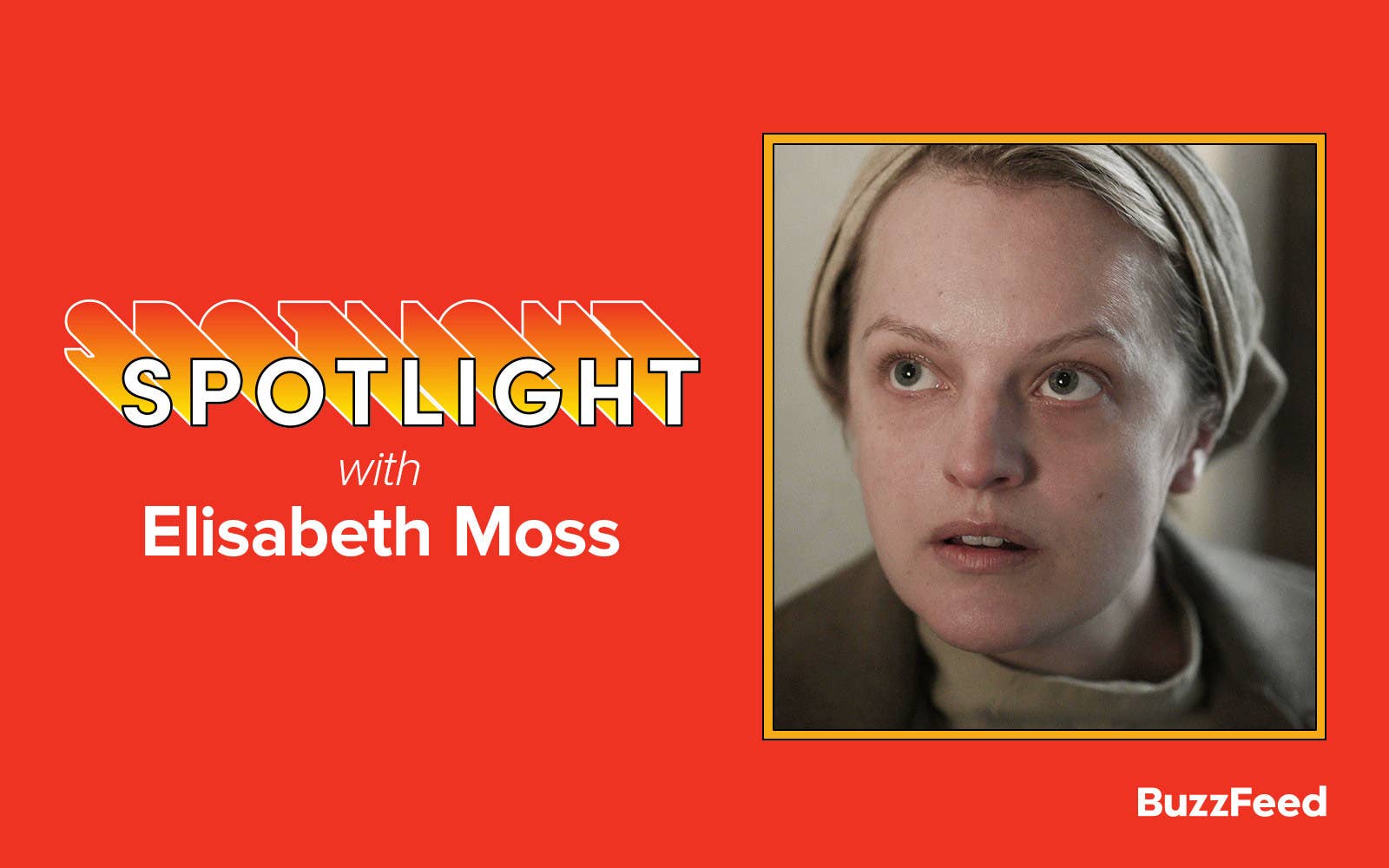
After over a year without a new episode, The Handmaid's Tale finally returned with a brand-new season. Picking up after the jaw-dropping Season 3 finale, we're beginning to explore the world outside of Gilead more as June fights to free herself, her friends, and her daughter.
To celebrate The Handmaid's Tale Season 4, we sat down with Elisabeth Moss to chat about the first three episodes of the season. We talked about her directorial debut with Episode 3, what it was like acting in and directing such a monumental episode, Mckenna Grace joining the cast, and what we can expect from June's storyline moving forward. Here's everything we learned:
WARNING: There are massive spoilers ahead for The Handmaid's Tale Season 4, Episodes 1–3.
First, how was it directing your first episode of TV?
It was awesome. We contemplated me directing in Season 3, but the timing of it just didn't work. I actually decided myself not to do it because I felt like it wasn't going to be the best thing for the show. But, Season 4 came along and it became a moment of, "Well, I think I should do it or I may not have the chance." So, it was amazing.
I, of course, picked the hardest episode. I had a choice between Episodes 2 and 3, and I was like, "Well, of course, I'm gonna do 3, obviously." It was incredible and it was the hardest thing I've ever done, for sure, but also the most fulfilling. I had an incredible partner in Stuart Biddlecombe, who was my DP, and Elisabeth Williams, our production designer. Then, this incredible script written by Bruce [Miller] and then these actors. It was very much a collaboration, and it was so fun.
BuzzFeed: Episode 3 is a massive episode, not only for your character, but for the show overall.
Right? I had all these huge sequences. I was telling Erica, my publicist, I was like, "Can you imagine, I walk onto the studio set where we shot the roof scene, and there's a 360 blue screen, and we're doing rain, indoors." It was this massive stage inside our studio that we built, and it was my first time directing. I had one of those moments where I walked in in the morning and was just like, "Alright, here we go." Then, I had the train at the end. It was all of these gigantic set pieces that I had to do. So, it was incredibly challenging, but it was really, really fun.
Did you know going into Season 4 that you'd be directing three episodes?
No, I didn't know I was going to be directing three episodes. For Episodes 8 and 9, it was kind of one of those things where everybody really liked Episode 3 and responded really well to it — the studio, the network, and everything — and we needed a director for Episodes 8 and 9, and I had read the scripts and I felt that I could do a good job with them. They were very, very different from Episode 3. Very different. I wanted that challenge, so I kind of put myself up for the job. I just said, [laughing] "Hey, I'm available."
BuzzFeed: "I'll already be on set. I'm here."
[laughing] Yes, like, "I'm in Toronto to do, you know, this show." And they embraced it, which was really great.
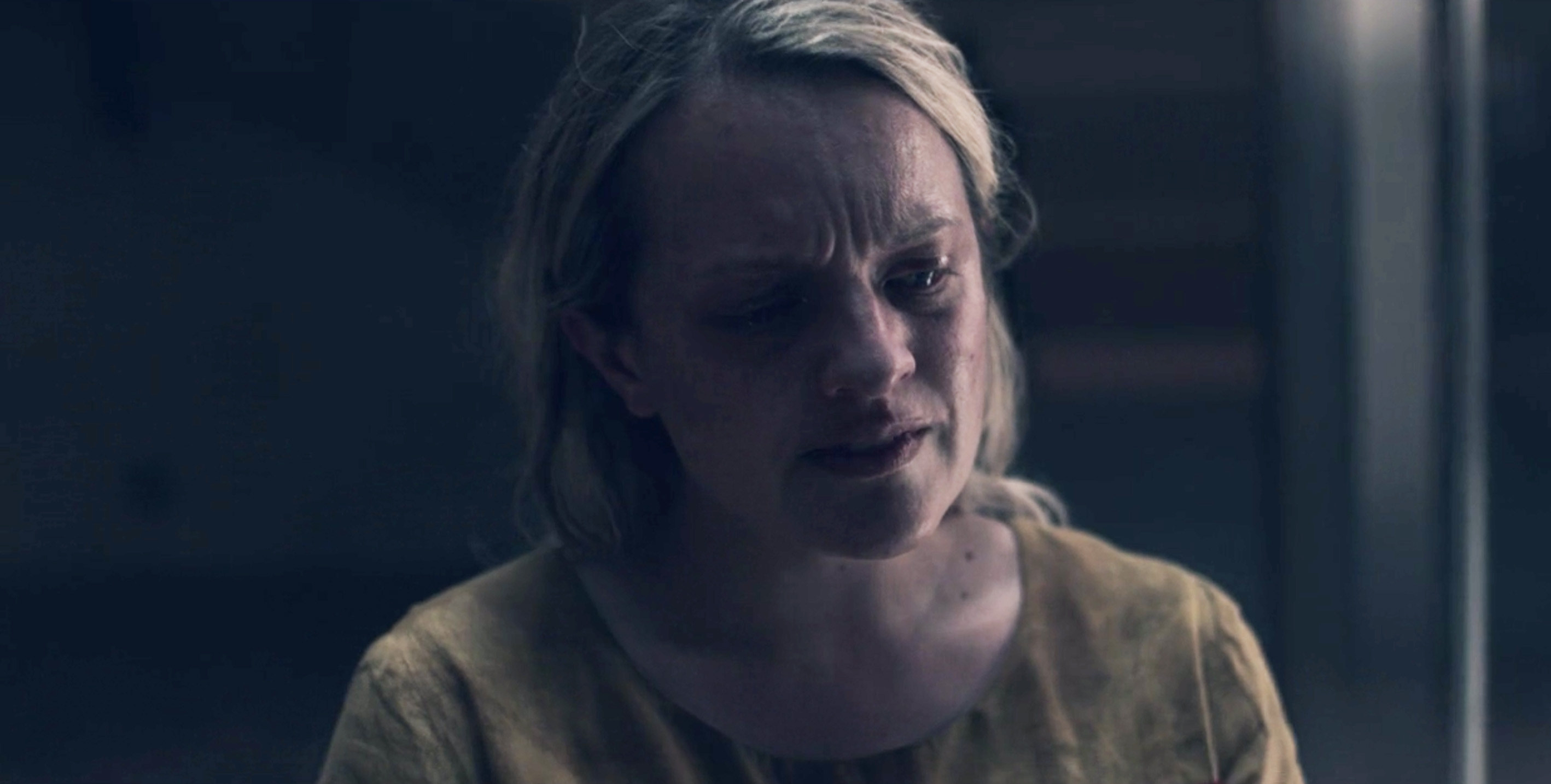
While I was watching Episode 3, I just kept thinking about how you were performing these really intense torture scenes, then I had this image of you, like, running behind the camera to direct. What was it like balancing all of that?
Yeah, quite literally that was what was happening. Like, I was doing an intense, dramatic take, then going to the monitor and watching. I kind of got used to it by the end.
BuzzFeed: And you said you got to choose between Episodes 2 and 3 to direct, so you chose the episode you're in much more of. Was that intentional?
Yeah, like you said, I'm in much more of Episode 3 than I am in Episode 2, and that was part of the thing, I was like, "Well, maybe I should do Episode 2 because I'm not in as much of it." But I was like, "What's the fun in that?"
You're obviously really close with the cast, so how was it directing them for the first time?
So, directing the actors was probably the thing that I was most nervous about because I am not, like, a method actor. I've never had any training. I wasn't sure how to necessarily speak to the actors in a way that was helpful. So, that was the thing I was most nervous about. It ultimately became the thing that was my favorite part because, you know, I don't think you really appreciate what a good actor can do until you work with them as a director.
As an actor, we see the final product, we see what has been edited, and with music and sound, and it's incredible. But when you work with the raw talent and you go up to somebody, like Ann Dowd or Bradley Whitford, and you have a thought for them for the next take, and then you go back to the monitor — or you're standing in the scene with them — and you see how they took that note and how they bring it to life, it's a mind-blowing experience. I would cry. I turned out to be one of those people that cried at the monitor a lot. I turned out to be one of those directors because I was so moved by how good they are as actors.
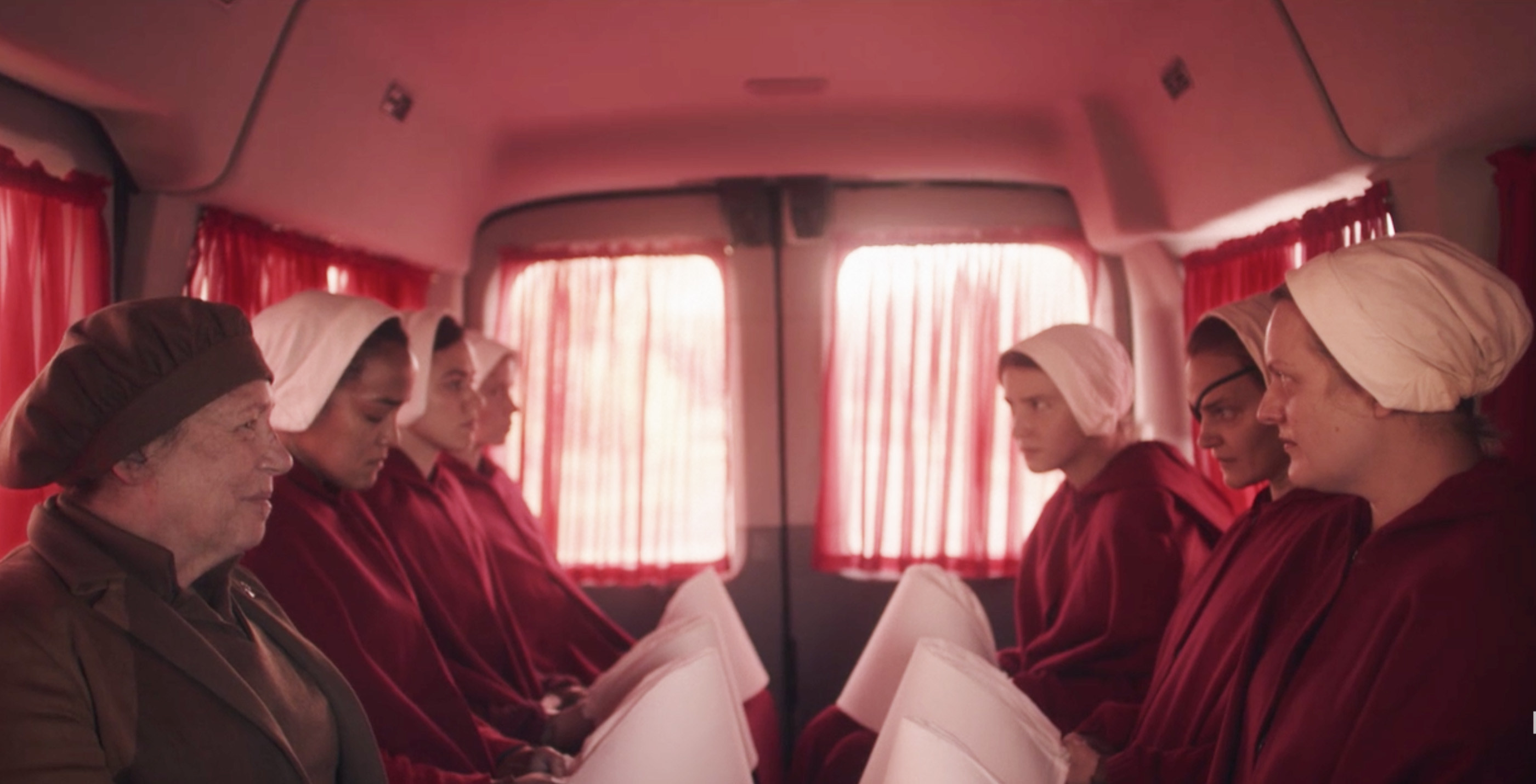
Episode 3 is a big June and Aunt Lydia episode as well. How was it directing Ann Dowd?
I would say Ann and I, we had a very deep and meaningful friendship before this season, and now, we are even more bonded than before. She's like a soulmate for me. Working with her as a director was just so incredibly fulfilling. She trusted me so much. It was challenging and interesting, and she's just remarkable. I wish everyone could direct Ann Dowd, so they could experience it. I know everyone knows how great she is, but you really see it when you're directing her.
I don't know why I ever think everything's going to be okay, because I was truly stunned by the train moment at the end of Episode 3. From a director's standpoint, how was it filming the train sequence? Was it challenging?
It was hard. Being on the technical side of it was challenging. There's no train at all. The train is entirely VFX. So, there's just the track and there's nothing else. Designing the sequence was challenging for Stuart [Biddlecombe] and I. Originally, we had a very long oner [one take], and then we realized that we were going to miss a lot of the faces and the women. We wanted to see these woman, especially the ones who were in their last moments. We had to feel like we were with them. So, we redesigned it over the six-month break that we had [due to the coronavirus pandemic shutting down production]. That time gave us an opportunity to redesign it a little bit.
Shooting the scene was very challenging too. The first day was raining and the second day there was not a cloud in the sky, which was a problem as a new director. I was like, "Okay, this is an experience that I am now getting. What the hell do you do when this happens?" You're shooting one scene that now has two completely different looks. The part that you see when they're outside and they're running, and it's raining, that was filmed on the first day. And then, a lot of the stuff inside the birth mobile was actually on the second day. [laughing] So, it's a little sunnier, but we were able to fix it a bit in post-production.
And then, just as an actor, how was it saying goodbye to those characters?
I mean, they're fantastic actors. Bahia [Watson] and Nina [Kiri] are some of the kindest, funniest, most talented women I've worked with. They were great. They were light-hearted and they had fun. They enjoyed themselves, but we knew it was a bittersweet goodbye. The train wasn't the last scene they were going to shoot, we were shooting another scene, but we knew it was their characters' last scene in the show. There was an emotion to that. So, when we did their last shots, there were some tears from me. I think they put everything into the show, they put everything into their characters, and they put everything into their last moments.
BuzzFeed: Do you remember which scene Bahia and Nina filmed last?
So, because of the sun that I mentioned on that second day, we actually had to go back and shoot some of the birth mobile moments. It was basically too sunny, so we had to go back and shoot them at a later date. So, jumping out before the train, that was their last stuff.
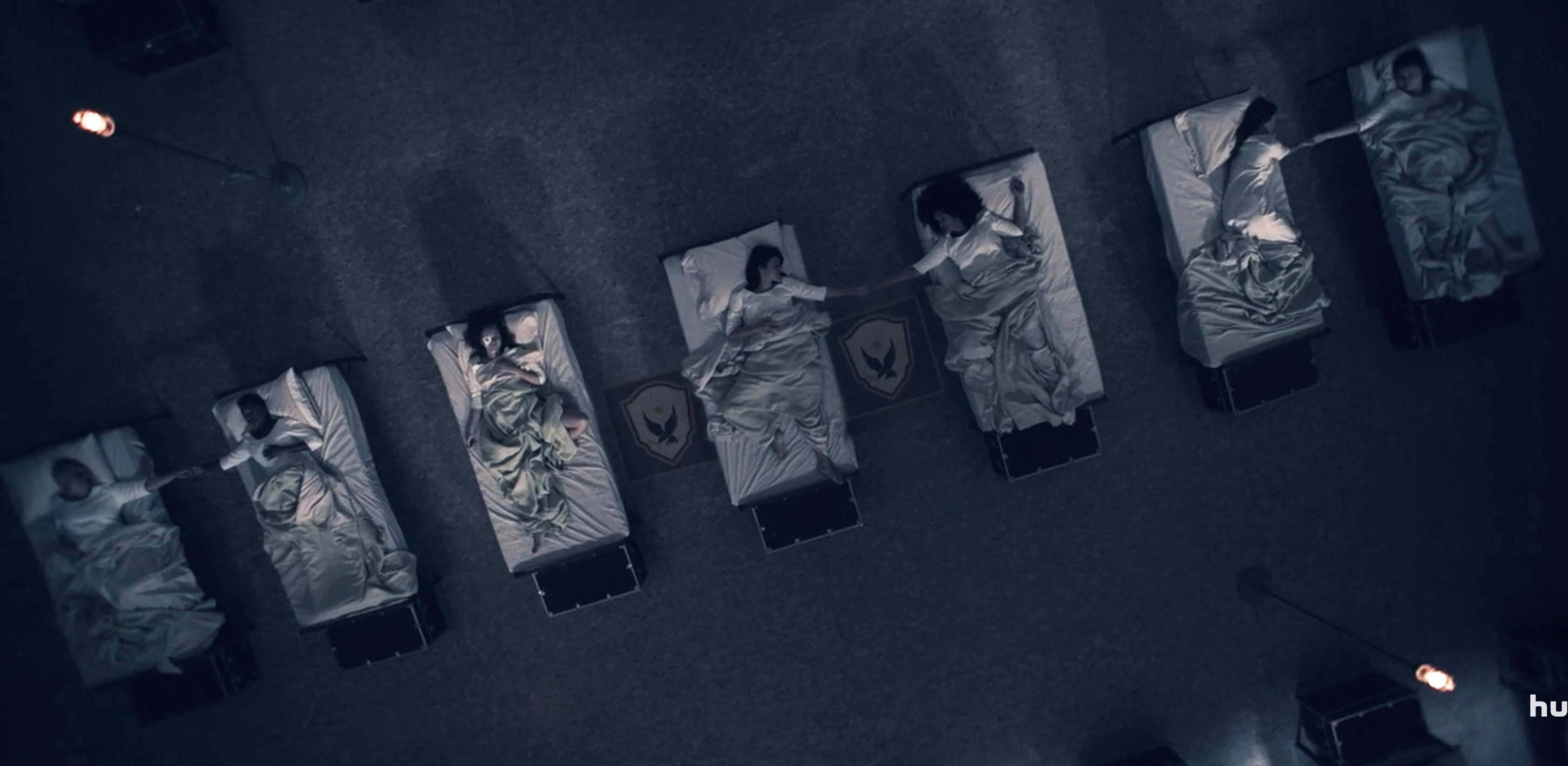
One of my favorite shots from the whole episode is the final flashback moment where we see June, Moira, Janine, and the other Handmaids holding hands in bed. How was it shooting that moment?
Oh my god, thank you! I had this idea of that shot reflecting a Grecian relief. That last shot going up is an incredibly complicated shot to do. It's ridiculous. It starts in a close-up and goes up, and then it spins. The reason why it ends on an angle — that was not the plan — was we couldn't get all the women in [the frame] because we couldn't get high enough for it to include all the women in the beds. So, we had to spin it and it ended up being way better.
BuzzFeed: I loved the zoom out and then you realize in June's voiceover that she is naming the Handmaids in the order they are lying in. It was so amazing.
Yes, oh my god, I am so proud of that. Ugh, I love this scene so, so much. The voiceover is from the book. Those words end the first chapter of The Handmaid's Tale. And, in that part of the book, that's the only time she mentions the name June. So, the only thing that we changed was a couple of the names to reflect the names of the actual characters in our show. But, ugh, I cry every time I watch that scene.
BuzzFeed: I was sobbing.
Literally same! I cry every time. Just seeing those women and their faces.
BuzzFeed: How often do you still pull quotes directly from Margaret Atwood's book?
We do it a lot, but we haven't done it in a while because we've used so much from the book in voiceover already. But yeah, [this quote] is one of my favorite pieces from the book. So, I was so excited to see that in the script.
One of the many moments that stood out to me in Episode 3 is when June realizes that Hannah is afraid of her. How does that change June's mentality going forward in Season 4?
It's pretty scarring. I think it really breaks her. I think there's a chance before that, for June, that she would've maybe become a person closer to the person that was originally captured in Gilead. Her experience [with Hannah] is so scarring that I think that it makes it impossible for her to return to that former life and to return to that person. If you've spent your last six years, or however long it is that she's been in Gilead, with your number one mission being to get your daughter out safely, and then she doesn't recognize you and she's afraid of you, it changes you. I don't think it's something that she will ever, ever come back from and we do deal with it very significantly in the rest of the season. It's a huge part of June's storyline in the upcoming episodes.
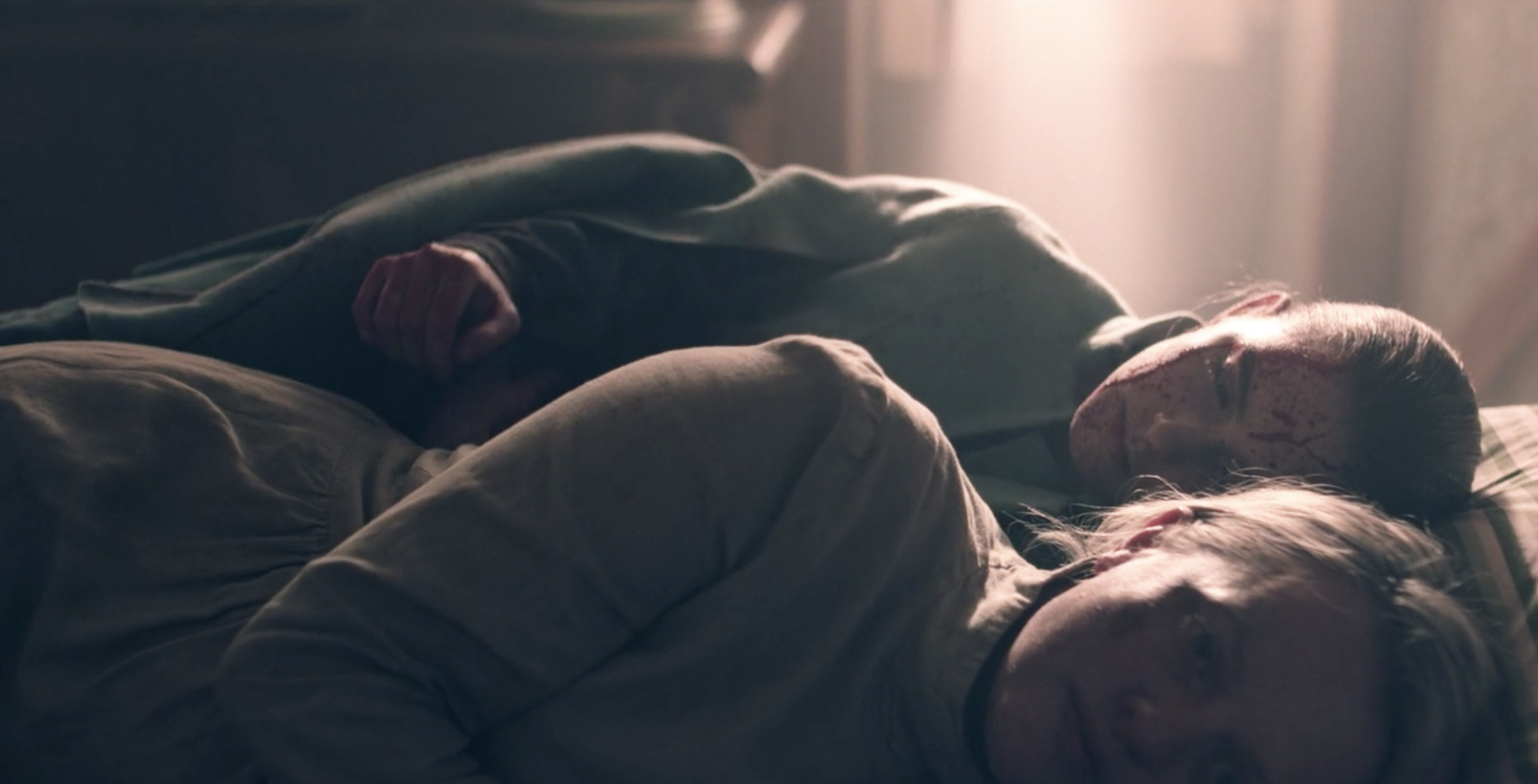
And finally, Mckenna Grace is a great addition to the cast in Season 4. How was it having her join and playing June's relationship with Mrs. Keyes?
It was so exciting. She really gave such a spectacular audition and is such a special person. It was lovely because I was an actor at that age. So, it's always fun for me to work with younger actors because, I don't know, I just remember that experience so well. Mckenna is a lot like me when I was that age. She's very serious and very professional. I remember she would like to go watch the monitor. I'd be watching it and she'd come over and say, "Can I watch?" So, she'd watch the monitor with me and watch her performance, and I'd ask what she thought, [laughing] and she'd say, "It's pretty good." She's such a smart, smart young woman. It was such a pleasure and I hope I get to work with her again outside of The Handmaid's Tale.
